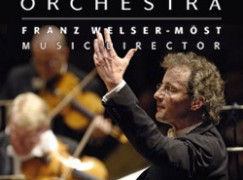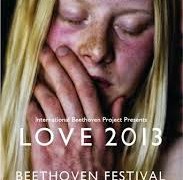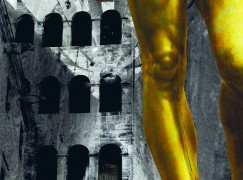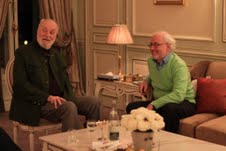In a gesture rare for an ultra-cautious sector, the Cleveland Orchestra has nailed its colours to a rainbow mast. Read the press release below.

The Cleveland Orchestra salutes the Gay Games at Summers@Severance “Beethoven Experience” concert on August 15
Gay Games take on cultural flair with Band and Choral events in Cleveland+Akron: August 9-16
CLEVELAND — The Cleveland Orchestra proudly announces its community arts partnership with the 2014 Gay Games, being held this summer in Northeast Ohio. The 2014 Gay Games presented by the Cleveland Foundation takes place August 9-16 in venues around Cleveland and Akron. More than 35 sports and culture events will be held, with more than 20,000 people from more than 50 countries expected to participate and visit the region.
The Cleveland Orchestra hosts a kick-off welcome for the 2014 Gay Games at Blossom on July 27. The concert, Broadway Standing Ovations, conducted by Jack Everly, includes Broadway highlights from The Phantom of the Opera (featuring Broadway’s “Phantom” Ted Keegan), Wicked, Rent, Les Miserables, and more. A special promo code for discounted tickets is available for the concert through the GG9 website, www.2014gaygames.com.
And, during Games Week, The Cleveland Orchestra takes up the entertainment baton at Severance Hall for a special Summers@Severance concert on Friday evening, August 15. The all-Beethoven concert, conducted by Jahja Ling and titled “The Beethoven Experience,” features pianist Orion Weiss performing in Beethoven’s Choral Fantasy with the Blossom Festival Chorus. The concert features a pre-concert “happy hour,” an early start time of 7 pm for the performance, with musical selections running about an hour, followed by a casual post-concert “conversation and celebration” on the front terrace of Severance Hall. Specially discounted tickets for this are also available by obtaining a promo code through the GG9 website www.2014gaygames.com.
In the spirit of inclusion, the Gay Games are not just about sport — a cultural component also runs throughout the week. Band and Chorus are both among the more than 35 sports and cultural events in which individuals can participate during the 2014 Gay Games, presented by the Cleveland Foundation. Northeast Ohio residents who prefer spectating to participating can find something to entertain them almost every day during Games Week. Opening Ceremony on August 9 at Quicken Loans Arena is a full-scale spectacular, “Rock ’n’ Rubber,” celebrating the rich history of Northeast Ohio and the Games. Featuring Lance Bass, the Pointer Sisters, Broadway singers, community chorus, marching band and much more, the evening promises to be extraordinary.
PlayhouseSquare then becomes the home for band and choral performances featuring participants from all over the world. On Tuesday, August 12, at 7:30 pm, the 100-member Lesbian Gay Band Association, a modern symphonic band led by Jadine Louie, performs “Personal Best.” A second musical performance, “The Big Cleveland Sing,” takes place on Wednesday, August 13, at 7:30 pm featuring singers from all over the world, as well as Cleveland’s North Coast Men’s Chorus, Windsong, and Good Company Women’s Chorus. The Gay Games Festival Chorus will be led by world-renowned artistic director Dennis Coleman from Seattle. Both performances will take place at the State Theatre.
Tickets information for Gay Games events are available at www.2014GayGames.com, where details about the discounted ticket offers for the two Cleveland Orchestra concerts can also be found. More than 100 community partners, including The Cleveland Orchestra, are supporting the event and planning activities leading up to and during Games Week.
Click the word ‘Post’ to see rehearsal footage.
Dragiša Savic, who has died aged 89, was one of Serbia’s leading conductors. Among his achievements was starting the radio orchestra in Sarajevo.

We learn of the death of Maurice Meyer, a longterm player in the BBC Symphony Orchestra and the London Philharmonic. He was 88.
The son of an Iraqi ice-maker, Maurice was born in Burma, moved to Palestine in 1937 and came to London in 1950 to study with Max Rostal. Aside from playing in symphony orchestras, he entertained diners at the roof restaurant of the Royal Garden Hotel in Kensington. Late in life, he took up playing klezmer.
His son, Daniel, plays in the BBC Symphony Orchestra, and there are two grandsons.
Maurice died on June 23. In a bittersweet quirk of scheduling, he makes his last appearance on July 24 on BBC television playing in a Jewish wedding in the drama, An Honourable Woman. The scene was filmed eleven months ago.

Christoph Stepp, principal conductor of the Munich Symphony Ochestra in the 1990s, has died, aged 86.
A local personality, he founded the Munich Chamber Orchestra in 1950, served as a conductor at the Staatsoper for several years, also taking posts at Augsburg, Pfalz and Remscheid. He led several tours of Japan.

The roof organisation for George Lepauw’s Beethoven Festival, which failed to pay many musicians for last year’s performances, has pulled out any future involvement.
John von Rhein reports in the Chicago Tribune: In a letter sent Wednesday to George Lepauw, president and artistic director of the festival’s parent organization, the International Beethoven Project, foundation executive director Thomas Zoells said he is withdrawing the participation of PianoForte Chicago and the PianoForte Foundation in the 2014 Beethoven Festival, which has been announced for Sept. 5-21.
Chicago Federation of Musicians has threatened a boycott of Lepauw, a young musician who got in way over his head and seems to have no way back.

The first question is an absurd Telegraph headline.
The second should furrow some brows.
With unique artists, you cannot compare like with like.

A statement by artistic director, John Berry:

In a climate of decreasing public investment in the arts, an explosion of new technologies and changing audience expectations, every sensible company has been thinking creatively about how to make more with less. We knew we’d have to come up with a plan which protected our unique artistic qualities but at the same time make big changes where needed. This is what we have begun to do.
While it’s challenging to manage such a substantial reduction in our funding, we have been planning for this decision for some time. We are radically reinventing ourselves, and the Arts Council’s offer of transition funding is very welcome in helping us do this.
ENO won an Olivier Award two years ago for the breadth and diversity of our artistic programme and just last week we finished a smash-hit run of Terry Gilliam’s production of Berlioz’s Benvenuto Cellini. It is this type of adventurous project that defines ENO and the kind we want to do more of. We need to attract ever more diverse audiences, including more first-time opera-goers, to the “Coli”, as our home is affectionately known, and to the Barbican, the Young Vic, Bristol Old Vic and cinemas — all venues where you’ll see our work in the months and years ahead.

We intend to carry on playing a key role in the London, UK and international arts scene and economy by collaborating with innovative British companies such as Improbable, Complicite and Fabulous Beast, London 2012 Olympic video artist 59 Productions and British artists such as Fiona Shaw, Richard Jones and Tom Morris. We will also continue to provide unique opportunities for new and established British singers, composers, conductors, directors and designers.
We will maintain our partnerships with 40 opera companies around the world — collaborations that have brought more than £20 million in investment to the UK over recent years and made it possible for London audiences to see exciting new work that without those partnerships would not have been made.
How are we going to do all that in the face of funding cuts? We’re going to be as creative off the stage as we are on it.
We’ve already formed collaborations with commercial partners willing to make substantial investments in ENO’s vision — such as Michael Grade and Michael Linnit, with whom we’ll begin producing large-scale, high-quality musical theatre next season, and with restaurant chain Benugo. The BFI and the British Museum have been transformed by Benugo and it is going to help us open up the Coliseum to visitors throughout the day. Plus we have the invaluable support of a network of friends, donors and partners and a whole heap of dedication from the incredibly talented people we have working in our team.
There’s more to do and maybe you won’t even notice the changes if your gaze is fixed on the performances on our stage. That’s how it should be. But behind the scenes we’ll be working hard to make sure ENO is fit for the future and our work is totally unmissable.
Because this isn’t about being a winner or a loser — it’s about making sure that everyone benefits from something that is so much more than a game.
Colum McCann, whose novel Dancer depicted the inner life of the great Rudolf Nureyev, was taken to hospital in New Haven, Ct., after trying to help a woman who was being attacked.
He’s a good man and a terrific writer. We wish him a swift recovery.

We reported a couple of days back that the Lyric Opera had a record year.
Larry Johnson, one the scene and on the ball, points out that the company had to draw down $15 million from its endowment to stay in the black.
Read here.

A remarkable document has been retrieved and published by two Mahler scholars, Morten Solvik and Stephen E. Hefling. It consists of a letter to her literary executor by Natalie Bauer-Lechner, a viola player who attached herself to Mahler at college and became, for a decade, his personal chronicle during vacations that she took with his family. Her memoirs are vivid and, to all appearances, invaluably objective.
Natalie was in love with Mahler, of that there is no question. Mahler mostly tolerated her and was sometimes irritated enough to banish her. After his marriage to Alma in March 1902, she was expunged from his life. She died impoverished in 1921.

It has been generally assumed until this discovery that Mahler was not physically attracted to Natalie – in fact, actively repelled by her. There is one incident in Berlin when she appeared to force herself upon him and was driven from his room.
In the sixty-page letter, however, Natalie claims to have enjoyed a full sexual relationship with Mahler through the 1890s, avoiding detection by his jealous sister, Justine. She was also, at the time, in an open relationship with Mahler’s married friend Siegfried Lipiner.
Natalie goes on to list in the letter several more of Mahler’s lovers, including the singers Marie Renard, Rita Michalek and Selma Kurz – but not his protégée Anna von Mildenburg, with whom we know from passionate letters and other evidence that he had a relationship.
So what are we to make of this fascinating new document (which you can read here in German and English)?
If the letter is factual, every Mahler biography including my own will have to be rewritten. If not, it may cast doubt on the authenticity of other facts for which we rely upon Natalie as sole witness.

Given certain internal inconsistencies in the letter, some of which are noted by Solvik and Hefling, the prospect of rewriting biographies seems unlikely for the time being. Natalie , when she wrote this document,was a woman in her late 50s, looking back on two men, Lipiner and Mahler, neither of whom returned her feelings. She loathed Justi and Alma and may have revenge. She was also unwell, with spells of amnesia and mental illness.
These caveats aside, the letter cannot be ignored. The passage in which she describes her first lovemaking with Mahler deserves to be widely read – not least because Natalie maintains that it was his love for her that brought the third symphony and ten songs into being:

‘Gustav drew me up to his room in the attic…. The way we found ourselves there’ locked in tight quarters and separated from the rest of the world, unfolding our entire lives to each other until the early dawn in the most moving, intimate Scheherezadian manner of telling; the way that the creative power in Mahler, drained away for ten years, returned anew, more powerful than ever because of my belief in his genius and my enthusiastic encouragement…. Would it not have been a wonder, even a sin, if such a transfiguration and consummation of life had not been followed by the highest expression of love?’
The German conductor, who turns 87 on July 18, has been obliged to withdraw from his annual birthday concert in Paris with the Orchestre Nationale de France. Kurt is struggling with Parkinson’s Disease. We send him warm wishes for his birthday.
















